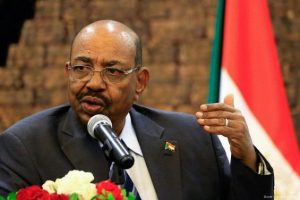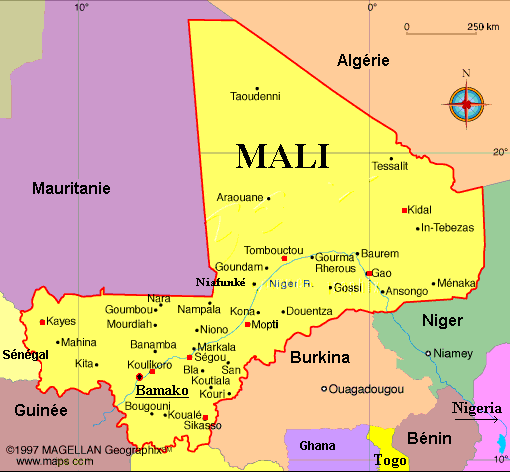It is in the national interests of the USA to deprive China of access to African energy resources, with the Sudanese oil fields being the only Chinese owned and operated in Africa. It was no coincidence that one of the first targets of the “rebellion” in South Sudan was the Chinese oil fields. It has been US vs China in South Sudan from the start.
To begin this history we must go back to the origins of the South Sudan peace process that developed in 2004. This new breakthrough came about following the East Sudan uprising and subsequent intervention in Sudan by the Eritrean military in support of the Beja and Rashida peoples movement in 2003. Eritrean commandos cut the Port Sudan-Khartoum highway, the lifeline for 25 million residents of Sudans capital. For two weeks the Sudanese army counterattacked and ended up utterly defeated by the Eritrean special forces.

Facing critical food and fuel shortages the Sudanese officer core that was then the base of support for the recently deposed
Omar Al Bashir capitulated and as part of the peace deal agreed to begin good faith negotiations with the various Sudanese resistance groups, both east, south and even, supposedly, in the west.
This resulted in John Garang, head of the Sudanese Peoples Liberation Movement and the President of Sudan Omar Al Bashir sitting down together to sign a comprehensive peace deal in Asmara, Eritrea late in 2004.
In December of 2004 we flew into Asmara, Eritrea and checked into the old Imperial Hotel, the Emboisoira, and found ourselves sharing breakfast with senior leaders of the SPLM. We had a satellite dish back in the US with EritreanTV so we had seen our breakfast mates on the news covering the recently signed peace deal in Asmara. They were all in high spirits, still excited about the prospect for peace in Sudan.
Later, after returning home to the USA in 2015 we heard of a new peace deal, this time being signed in Navaisha in Kenya. And this time the deal was brokered by the USA. The only real difference between the 2004 Asmara agreement and the 2005 Kenya deal was the inclusion of a clause calling for a referendum on independence for South Sudan.
The USA forced Bashir and Garang to accept this independence referendum after forcing a new peace “negotiation” and eventual, deal, in Kenya, away from Eritrean mediation efforts. Carrot and the stick, inducements and threats by the worlds superpower forced Garang and Bashir to accept the dismemberment of Sudan and created the conditions for one of the most brutal civil wars in African history. This was the doings of the USA from the get go.
After signing the peace deal John Garang, as head of the Sudanese Peoples Liberation Movement (SPLM), held his first public rally in Khartoum and drew a million people or more, three times the largest crowd Bashir had ever had.
There he made a fateful speech.
John Garang made it clear that he was strongly AGAINST independence for South Sudan, instead calling on his fellow Sudanese in the North to help elect him president to build a new Sudan based on equal rights and justice for all Sudanese.
Garang stated his intent to be politically independent from the western powers instead looking to China, already in the oil business in Sudan, to develop Sudans economy. Sudan, as a whole, is the largest and potentially richest country in Africa and for the USA to lose Sudan to China wasn’t acceptable to Pax Americana.
John Garang was dead two weeks later in a mysterious helicopter crash and with him died a unified Sudan.
With in a few years a referendum was held for “independence” for South Sudan and voila it was a done deal. The irony is that John Garang, who was vehemently against independence for South Sudan, is now proclaimed “The Father” of the South Sudanese independent state.
In 2009 my old friend Alexander Cockburn contacted me asking for a story about what was going on vis a vis Sudan/South Sudan. I had been living next door in Eritrea for the past few years and I responded with “Storm Clouds Over South Sudan” which Alex and Jeffrey St. Claire published on their website “Counterpunch” where I predicted the upcoming holocaust in the worlds newest “independent” country.
I only wish my words had not come true.
I was repeatedly forced to continue exposing the CIA’s dirty war in South Sudan over the next few years with titles like “US vs China in South Sudan”, “The CIA’s DIrty War in South Sudan” amongst others in an attempt to shine the light of day on this most dirty, and secret, CIA covert war.
I am not exaggerating when I call the civil war in South Sudan the most secret major covert military operation by the CIA in the Agency’s history. The proof of this is the fact that not a single writer other than myself has made this charge. This might be explained by the lengths prominent western journalists have attempted to point the blame away from the Agency and instead at the South Sudanese peoples themselves.
It’s been horrific first hand stories by award winning progressive journalists that painted this dirty war as black on black, African tribal violence at its worst.
When I pointed out to one of the more prominent journalists that the rebels were being paid $300 a month salaries, they denied the accuracy of my claim. In an exchange on Twitter he said that the rebels were making maybe $300 a year if that, so no need to explain the $6 million a month it would take to pay 20,000 rebel combatants salaries?
The problem with this assertion is that former South Sudanese rebel fighters have confirmed being paid $300 a month when they were under arms. In South Sudan young men join the army because it’s the only way to get enough money to feed your family, not out of patriotic zeal. When the money periodically dried up, usually stolen by the rebel generals, the soldiers start to leave, as my sources had experienced.
Do the math, 20,000 rebels paid $300 a month times 6 years plus food, fuel and ammo and you come out with over $500 million and counting? Honestly now, who has a history of coming up with that amount of cash, entirely secret for that long but the CIA? Must we be reminded of the CIA’s dirty wars in Angola and Mozambique in support of South African Apartheid back in the 1970’s and 80’s?
Show me the money, right? How come no one in the international media has ever asked this question? The rebels have no visible means of support, where could they be getting their funds from?
This story remains the best kept secret “dirty war” the CIA has ever operated. Until the Chinese brought in a couple thousand armed “peacekeepers” to protect their oil fields this CIA operation was successful, shutting down, temporarily Chinese oil production in South Sudan. But more importantly, it pretty much shut down Chinese expansion in South Sudan. That is what this dirty war was all about, preventing China from gaining a major foothold in Africa’s oil fields.
Show me the money? Show me the ONLY party that benefits from this war? Thats right, the ONLY party to benefit from this brutal, foreign funded African holocaust has been Pax Americana, the U.S. of A, by shutting down Chinese oil production and expansion in South Sudan.
Today peace has broken out in South Sudan, shaky as it may be. The CIA had been using the former regime in power in Ethiopia, the TPLF, to funnel their filthy lucre to the rebel armies in South Sudan but with the “Peaceful Revolution” breaking out in Ethiopia this avenue to the rebels was cut off. The rebel leadership had no choice but to cut a deal with South Sudan President Salva Kiir for cash so they could pay their troops salaries. No money, no honey, you get what you pay for and without hard CIA cash to pay their troops it became “Give peace a chance”. Of course corruption remains rife and stolen salaries for various ethnically based military departments have continued to cause revolts and instability.
Yet so far the peace deal signed, sealed and delivered in Asmara in 2018 has been holding. The CIA are now almost completely out of the picture in South Sudan though one should never underestimate the Agency’s capacity for evil. Its in the US national interest to deny China access to African oil so it will always continue to be US vs China in South Sudan, as part of Pax Americana’s designs for Africa as a whole.





